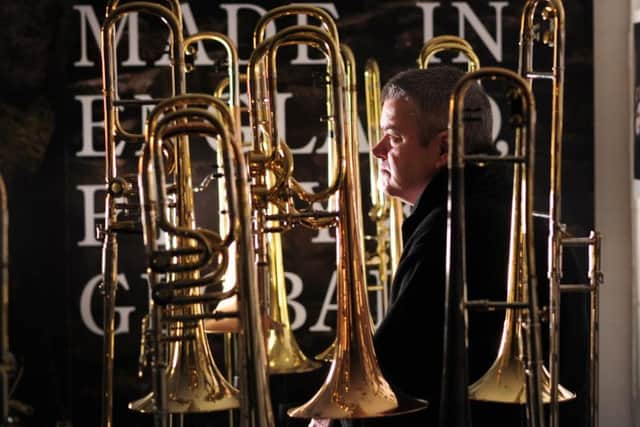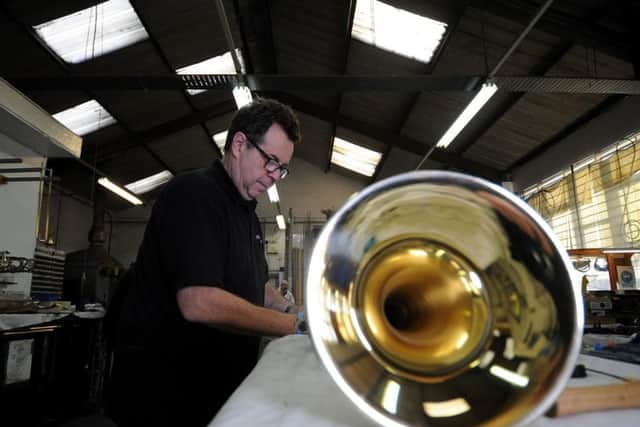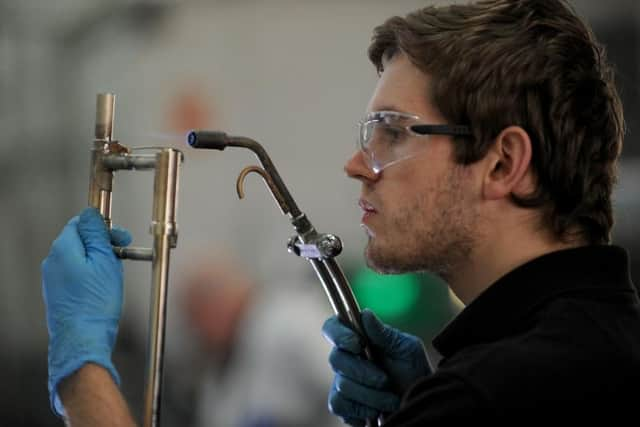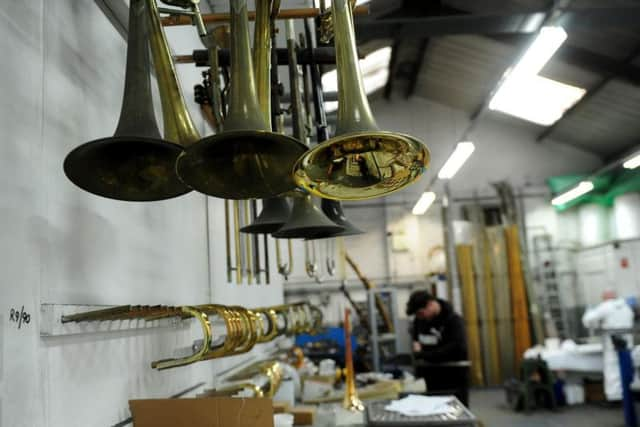Mick Rath’s trombones are played by some of the best orchestras and brass bands in the world and they are made here in Yorkshire
Looking back to his schooldays, Michael “Mick” Rath tends to agree with him. Now the owner of the acclaimed firm that makes Rath trombones – regarded throughout the world as some of the best instruments of their kind – he reflects that, when he was first introduced to the brass section of an orchestra, it was not an altogether magical experience.
“I was brought up in Windsor and back then every school had a music department,” Mick recalls. “Every child, regardless of potential ability, was expected to pick something or other up and to be taught to play it.
Advertisement
Hide AdAdvertisement
Hide Ad“Our music teacher went over to a cupboard in the corner one day and unlocked it. Inside was a collection of more than well-used brass instruments, all of which had seen far better days.


“He handed me an E flat bass tuba. And that was it. There was, in those distant days, the added incentive of someone coming in every week and giving you free lessons. The local education authorities paid for it all.
“I was happy to go with it all, because my best mate also agreed to learn at the same time. And then the inevitable happened – my mate packed it in. I have to admit, looking back, that we were probably making the most awful noises, terrible sounds echoing down the corridors.”
Buddy Brook - the Yorkshire artist carving sustainable works out of woodTo his surprise he rather enjoyed the experience. “It was fun and it was different. I actually started to get better.” It helped, he says, that the head teacher was a keen musician and encouraged his pupils in their playing.
Advertisement
Hide AdAdvertisement
Hide AdMick joined his school band and then the Berkshire Youth Orchestra. He was just into his teens when he was selected, along with a handful of other young musicians, to play in an ensemble often required to serenade one of the more distinguished local residents – the Queen.


“There were a lot of gigs in the Rose Garden at Windsor Castle and there was another time when Prince Charles arranged a sort of Victorian fair and our four-piece were asked to march around between the stalls, playing our instruments. You could say that I was ‘By Royal Appointment’ at the age of 16.”
There was a brief period when Mick thought about becoming a professional musician but then came a meeting with a careers teacher that led him down a slightly different path.
“He gave me the details of a course in musical instrument technology - in other words, repairing them and making them, instead of playing them.”
Advertisement
Hide AdAdvertisement
Hide AdThis set him on the way to running his own business – from Honley, near Huddersfield. Today, Michael Rath Trombones are the last UK firm in their specialised field and their instruments are internationally renowned and used by some of the best orchestras, bands and ensembles.


A Rath trombone is the Hockney of the art world. You can instantly tell it is a Rath trombone because the letter ‘R’ is subtly woven into the design on the brace of each instrument. “It makes it something personal,” says Mick.
Mark Addy on playing detective who caught Jeremy Bamber in White House Farm: “Parts like this don’t come along often”At college, Mick learned how to make, repair and engineer instruments and in his second year began to specialise in trombones. He was so skilled at what he did that players began to seek him out for his help and advice.
By the age of 22, he was pretty well established. His move to Yorkshire came after a relationship split up and when a mate of his announced that he was moving to the county to be with his own girlfriend.
Advertisement
Hide AdAdvertisement
Hide AdInitially he spent time living in the Leeds-Bradford area and worked closely with Woods’ Music Store in Bradford as he slowly developed a business of his own.


“It was 1994 and there was no internet or social media back then,” he says, “so it was that ‘word of mouth’ thing. You build up a reputation. That’s the hardest part. You can take years to get to a really good position, known for quality of work and reliability.”
He met and married Nicola and they now have two sons. There’s Oliver, 21, who has inherited his dad’s passion for music and is studying at the Guildhall in London.
“He plays a good jazz trombone,” says his father proudly. And there’s Tom, 19, an apprentice electrician. “He’s the sensible one”, says Mick. “He’s learning a good trade that will always be in demand.”
Advertisement
Hide AdAdvertisement
Hide AdThe business isn’t flash. It’s just off a main road, tucked away on a small industrial estate. Nothing much to look at from the outside but a player’s paradise indoors.
Rath Trombones employs around a dozen highly trained workers and all, bar one, can play an instrument. If they wanted to, the firm could field quite a decent little band.
They are almost solely dedicated to producing trombones, with, says Mick, “the occasional sackbut, which is the ancestor of the instrument we know today.”
There is production for the professional player and for the semi-pros in brass bands (that accounts for about 300–400 instruments a year) and also for instruments that go into schools.
Advertisement
Hide AdAdvertisement
Hide AdMost of the metal in the manufacturing process comes from Germany these days, while the valves are Swiss. All the rest is made in-house.
But if you think trombones are pretty much all the same, then think again. There are 20 different models and while one instrument will suit one particular jazz player, others are a better fit for the classical world. “The variety is pretty well infinite,” says Mick.
A top-end trombone will set you back anything from £2,500 up to nearly £9,000 and each instrument takes about 40 to 50 man hours to make.
He may be the boss of the business but Mick admits he frequently puts on his overalls and gets down on the workshop floor – which gleams with instruments in every stage of the process.
Advertisement
Hide AdAdvertisement
Hide AdThe firm is represented at trade fairs all over the world and those who believe brass bands are on their way out are mistaken.
“They are our biggest market and there are still plenty of them. To be honest, some of their players earn some good money – doctors, lawyers and the like – and they save up to buy an instrument from us.”
Meet the Yorkshire family who are part-time VikingsMick, who lives with his wife in nearby Newsome, spends a lot of time at work. “I’m here a full five days a week – unless I’m at an overseas event – and I’m more than often here for much of Saturday as well.
“I’ve been known to pop in on a Sunday, too. That happens when you run a business. I’m so lucky, though, because my hobby has been my job and my job has been my hobby.”
Advertisement
Hide AdAdvertisement
Hide AdThese days he doesn’t really play the trombone for pleasure. “I’ve got to the stage now where relaxation comes from making a nice Sunday roast and going to meet our friends in the local pub. But when needed, I can still put my hand to it. I can still play,” he adds.
The firm trains apprentices, sponsors local players and gets involved with the community. “I am very proud indeed of what we do and what we make. And yes, I am a perfectionist – in every way. Our name is on our product. That says it all. And I’m a great one for loyalty – both in the workplace and from customers.”
Many of the world’s leading performers choose to play a Michael Rath trombone, including artists such as David Gibson, Bert Boeren, Brett Baker and the Black Dyke Band, among countless others.
When it comes to his choice of relaxing music to listen to, Mick likes Michael Bublé “and a bit of swing” and admires players like Mark Nightingale and Dennis Rollins (who also play Rath trombones).
Advertisement
Hide AdAdvertisement
Hide AdNow 56, Mick has worked hard to get where he is but if there’s one bugbear it’s his desire to see music put back on the agenda in schools. “They say it isn’t a necessity, but it is,” he says. “Music opens up whole new worlds. It’s good for mental health and wellbeing.
“It’s creative and gives you freedom of expression. Youngsters don’t have to turn professional. It’s there for them to enjoy. And yet it’s treated as a sort of airy-fairy subject. That attitude makes my blood boil.”
Maybe he needs to let rip on one of his own trombones? “Yes, maybe I do,” he says.
For more information go to www.rathtrombones.com